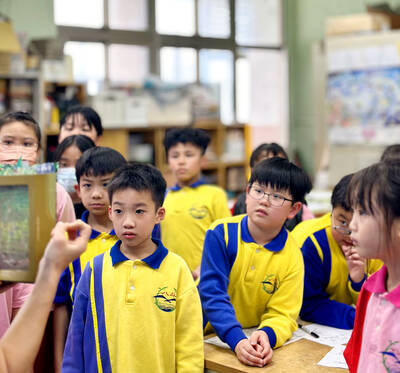In an evening dominated by alternative acts, Jay Chou (周杰倫) picked up his award for Best Single Producer, but it was independents who won big. Folk rock outfit Sodagreen won the coveted Best Band award, but even in the prestige categories such as Best Producer, independents dominated. And even in categories that are the exclusive realm of the big labels there were upsets, with South Korean Nicky Lee beating out six-time nominee David Tao for the best male Mandarin singer.
The 18th Golden Melody Awards, the music industry's night of backslapping and mutual congratulation, took place last night at the Taipei Arena (台北巨蛋). The annual event gives out awards to professionals making music in Mandarin, Taiwanese, Hakka and Taiwan's Aboriginal languages. This year, the nominees were drawn from record-breaking 8,103 entries by a 33-member panel of judges.
Despite afternoon showers thousands of teenagers and groupies laid siege to the stadium to ensure a good view, despite the absences of heavyweight pop idols such as Jay Chou and David Tao (陶?).

PHOTOS: AGENCIES
In this less than star-studded event, the two hosts, Momko Tao (陶子) and Patty Hou (侯佩岑) wearing NT$80 millions worth of jewelry, where the brightest stars on the red carpet dominated by alternative musicians and indie bands.
This year, the awards for artistic and traditional music were held earlier in the month, ensuring that the party last night went more smoothly with the absence of the non-pop crowd, who always looked so out of place among the glitterati.
Huang Chien-wei (黃建為), a college student whose folk debut Over the Way is inspired from the tranquil island life and rural landscapes, picked up the award for Best Newcomer early in the ceremony, setting the tone for what was to follow.

Lin Sheng-xiang (林生祥), considered by many as one of Taiwan's most original musicians, was awarded Best Hakka Singer and Best Hakka Album for Planting Trees (種樹). Lin used his acceptance speech to refuse the awards to signify his disapproval of the language-based categorizations used for the Golden Melody Awards. He announced that he would donate the prize money to four community groups working with Taiwan's agricultural communities, and expressed his support for the so called "rice bomber" Yang Ju-men (楊儒門). "It is music that gathers us here, not languages. So the event's subject should be the musical vocabulary rather than linguistic
differences," Yang said.
Always merging his music with sociopolitical messages, Lin has been a frequent GMA winner ever since the now disbanded Labor Exchange (交工樂隊) that was awarded major honors in 2000 and 2002. In 2005, Sheng Xiang and Water 3 (生祥與瓦窯3), Lin's music project with his long-term partner Zhong Yong-feng (鍾永豐) won Best Band, Best Hakka Album and Best Lyricist with Getting Dark (臨暗) that turns a sober gaze at globalization that sweeps the world.

In the Best Singing Group category, popular pub duo Hao-en (昊恩) and Puyuma songstress Jiajia (家家) took the trophy. The duo, breaking away from the stereotypes of Aboriginal music, have achieved considerable success on the pub circuit with their contemporary compositions fused with blues jazz, gospel and traditional folk music. (They are nominated for Best Mandarin Album, Best Singing Group, Best Producer and Best Composer). Folk rock outfit Soda Green picked up the highly coveted Best Band award. Having released four singles and two albums in two-years, Sodagreen had built up an audience base with campus tours and pub gigs and their self-titled debut album was nominated for the Best Composer and Best Band awards at last year's Golden Melody Awards. Formed by the six members during college, the folk rock band Sodagreen was a campus music luminary at the National Chengchi University (政治大學) and frequent winner for the school's annual music competition. Their career breakthrough quickly came in 2004 when the band took the jury award at Hohaiyan Rock Festival (海洋音樂祭) and discovered by musician and producer Lin Wei-tse (林暐哲).
In the Taiwanese music category, five-time nominee Shih Wen-bin (施文彬) picked up best male singer and taime (台妹) prototype Jeannie Hsieh (謝金燕) won best female.
One of last night's biggest surprises of last night came when last year's Best Band winner Chairman (董事長) beat off Judy Chiang (江蕙), the uncontested reigning queen of Taiwanese-language music and walked home with the Best Taiwanese-language Album. "We never thought we would win and our first reaction was like the title of the album "Jin Ei Ah Gey Ei" [meaning "you're kidding" in Taiwanese]," said the band backstage.

At the end of the evening, the prestige categories offered few surprises, as Jolin Tsai (蔡依林) finally won a long-overdue award for best female mandarin singer, and the evening finished on a slight note of confusion when MC Hotdog got the Best Album award, which may simply have been done to make sure that established artists did not completely disappear under the landslide of independent artists.
The Winners
Best Song 最佳年度歌曲獎
You are Marrying Me Today (今天妳要嫁給我)
Best Mandarin Album 最佳國語專輯獎
Wake Up
Best Producer 最佳專輯製作人獎
Chen Hui-ting (陳惠婷), Hsu Chih-yu (許哲毓), Lin Chien-yuan (林前源), Lin Hui-pin (林揮斌), Hsu Chih-pei (許哲珮)
Best Male Mandarin Singer 最佳國語男歌手獎
Nicky Lee (李玖哲)
Best Mandarin Female Singer 最佳國語女歌手獎
Jolin Tsai (蔡依林)
Best Taiwanese Female Singer 最佳台語女歌手獎
Jeannie Hsieh (謝金燕)
Best Aboriginal Singer 最佳原住民語歌手獎
I Chi (伊吉)
Best Taiwanese-language Album 最佳台語專輯獎
Jin Ei Ah Gey Ei!? (真的假的!?)
Best Hakka Album 最佳客語專輯獎
Planting Trees (種樹)
Best Aboriginal-language Album 最佳原住民語專輯獎
Folk Songs from the Heart (美麗心民謠)
Best MV Director 最佳音樂錄影帶導演獎
Stephen Fung (馮德倫)
Best Songwriter 最佳作曲人獎
Wu Ching-feng (吳青峰)
Best Lyricist 最佳作詞人獎
Zhong Yong-feng (鍾永豐)
Best Composer 最佳編曲人獎
Chen Chu-hui (陳主惠)
Best Single Producer 最佳單曲製作人獎
Jay Chou (周杰倫)
Best Taiwanese Male Singer 最佳台語男歌手獎
Shih Wen-bin (施文彬)
Best Hakka Singer 最佳客語歌手獎
Lin Sheng-xiang (林生祥)
Best Band 最佳樂團獎
Sodagreen (蘇打綠樂團)
Best Singing Group 最佳演唱組合獎
Hao-en and Jiajia (昊恩家家)
Best Newcomer 最佳新人獎
Huang Chien-wei (黃建為)
Best Instrumental Album 最佳專輯獎
Send You a Blue Gift for Winter (送你冬日藍)
Best Instrumental Album Producer 最佳專輯製作人獎
Chen Jien-nien (陳建年)

May 26 to June 1 When the Qing Dynasty first took control over many parts of Taiwan in 1684, it roughly continued the Kingdom of Tungning’s administrative borders (see below), setting up one prefecture and three counties. The actual area of control covered today’s Chiayi, Tainan and Kaohsiung. The administrative center was in Taiwan Prefecture, in today’s Tainan. But as Han settlement expanded and due to rebellions and other international incidents, the administrative units became more complex. By the time Taiwan became a province of the Qing in 1887, there were three prefectures, eleven counties, three subprefectures and one directly-administered prefecture, with

It’s an enormous dome of colorful glass, something between the Sistine Chapel and a Marc Chagall fresco. And yet, it’s just a subway station. Formosa Boulevard is the heart of Kaohsiung’s mass transit system. In metro terms, it’s modest: the only transfer station in a network with just two lines. But it’s a landmark nonetheless: a civic space that serves as much more than a point of transit. On a hot Sunday, the corridors and vast halls are filled with a market selling everything from second-hand clothes to toys and house decorations. It’s just one of the many events the station hosts,

Two moves show Taichung Mayor Lu Shiow-yen (盧秀燕) is gunning for Chinese Nationalist Party (KMT) party chair and the 2028 presidential election. Technically, these are not yet “officially” official, but by the rules of Taiwan politics, she is now on the dance floor. Earlier this month Lu confirmed in an interview in Japan’s Nikkei that she was considering running for KMT chair. This is not new news, but according to reports from her camp she previously was still considering the case for and against running. By choosing a respected, international news outlet, she declared it to the world. While the outside world

Through art and storytelling, La Benida Hui empowers children to become environmental heroes, using everything from SpongeBob to microorganisms to reimagine their relationship with nature. “I tell the students that they have superpowers. It needs to be emphasized that their choices can make a difference,” says Hui, an environmental artist and education specialist. For her second year as Badou Elementary’s artist in residence, Hui leads creative lessons on environmental protection, where students reflect on their relationship with nature and transform beach waste into artworks. Standing in lush green hills overlooking the ocean with land extending into the intertidal zone, the school in Keelung